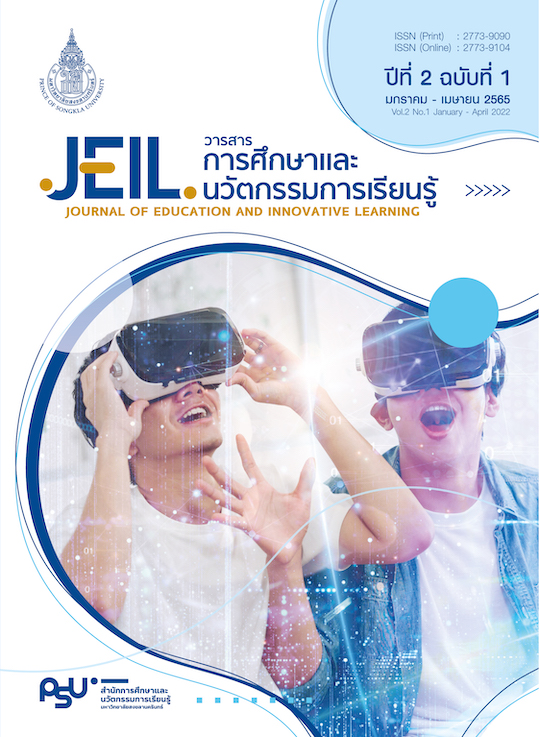ประสิทธิภาพในการเรียนการสอน รายวิชาการเขียนโปรแกรมคอมพิวเตอร์ผ่านช่องทางออนไลน์
Main Article Content
บทคัดย่อ
การศึกษาครั้งนี้มีวัตถุประสงค์ 1) เพื่อศึกษาผลสัมฤทธิ์ในการเรียนการสอนรูปแบบออนไลน์ แบบที่ผู้สอนบันทึกเทปไว้และแบบการสอนสด 2) เพื่อรับรู้ถึงคุณภาพของการเรียนการสอนรูปแบบออนไลน์ในรายวิชาการเขียนโปรแกรมคอมพิวเตอร์ 3) เพื่อนำความคิดเห็นของนักศึกษาไปพัฒนาการเรียนการสอนรูปแบบออนไลน์ให้มีประสิทธิภาพมากขึ้น เก็บข้อมูลจากนักศึกษาชั้นปีที่ 1 ปีการศึกษา 2563 ที่ลงทะเบียนเรียนในรายวิชา วศคพ 111 การเขียนโปรแกรมคอมพิวเตอร์ จำนวนทั้งหมด 15 คน เครื่องมือที่ใช้ในการวิจัย คือ แบบสอบถาม มีค่าความเชื่อมั่น 0.83 สถิติที่ใช้ในการเก็บข้อมูล ได้แก่ ค่าร้อยละ ค่าเฉลี่ย และค่าเบี่ยงเบนมาตรฐาน ผลการวิจัยพบว่า 1) การเรียนการสอนรูปแบบออนไลน์ทั้งแบบที่ผู้สอนบันทึกเทปไว้และแบบสอนสด การทำการบ้านหลังเลิกเรียนจะช่วยให้นักศึกษามีความเข้าในเนื้อหามากขึ้น ส่วนอุปสรรคในการเรียนทั้ง 2 แบบคือ ระบบอินเทอร์เน็ตที่ไม่ดีพอ อาจจะทำให้การเรียนสะดุด 2) คุณภาพการเรียนการสอนรูปแบบออนไลน์ในรายวิชา วศคพ 111 การเขียนโปรแกรมคอมพิวเตอร์ อยู่ในระดับปานกลาง เนื่องจากความรู้พื้นฐานของนักศึกษาแต่ละคนไม่เท่ากัน การเรียนและการทำแบบฝึกหัดจึงมีความจำเป็นที่จะต้องให้อาจารย์ผู้สอนเป็นผู้แนะนำแบบใกล้ชิด เพื่อทำให้เข้าใจเนื้อหาวิชาเรียนมากขึ้น 3) การเรียนการสอนในรูปแบบออนไลน์แบบผสมผสานทั้งแบบที่ผู้สอนบันทึกเทปไว้ และแบบสอนสด ช่วยให้นักศึกษามีความรู้ความเข้าใจเนื้อหารายวิชามากขึ้น นักศึกษาจะได้ทำความเข้าใจเนื้อหารายวิชาก่อนที่จะได้เรียนจริง
Article Details

อนุญาตภายใต้เงื่อนไข Creative Commons Attribution-NonCommercial-NoDerivatives 4.0 International License.
เนื้อหาและข้อมูลในบทความที่ตีพิมพ์ในวารสารการศึกษาและนวัตกรรมการเรียนรู้ ถือเป็นข้อคิดเห็นและความรับผิดชอบของผู้เขียน ซึ่งกองบรรณาธิการวารสาร ไม่จำเป็นต้องเห็นด้วยหรือร่วมรับผิดชอบใด ๆ และไม่สงวนสิทธิ์การคัดลอกบทความเพื่อใช้ประโยชน์ทางวิชาการ แต่ให้อ้างอิงข้อมูลแสดงที่มาของบทความทุกครั้งที่นำไปใช้ประโยชน์
เอกสารอ้างอิง
Hongsamad, Y., & Limtasiri, O. (2021). The comparison of academic achievement and satisfaction on solution topic of Mathayomsuksa 2 students between the online learning by google classroom and traditional method. Journal of Educational Innovation and Research, 5(2), 355-370. [in Thai]
Iramaneerat, C. (2020). Recommendation for managing online teaching and learning. Retrieved form http://www.cotmes.net/wp-content/uploads/2020/10/682_Online-teaching-รศ.ดร.นพ.เชิดศักดิ์-ไอรมณีรัตน์.pdf [[in Thai]
Kaosaiyaporn, O., Atisap, W., & Pochanukul, W. (2014). Development of integrated online course to enhance cooperative learning and inquiry skills for graduate student. Journal of Technical Education Development, 91(4), 34-42. [in Thai]
Laohacharassang, T. (2002). Designing e-Learning. Bangkok: Aroonprinting. [in Thai]
Ruayjinda, P., & Ekbovonwong, D. (2020). The comparison of attitudes towards online learning via video and live broadcasting of fourth year medical students at Medical Education Center, Surat Thani Hospital. An Online Journal of Education, 15(2), 1-12. [in Thai]
Sukanin, S., & Wongpanich, K. (2003). Open world e-learning: teaching on the internet. Bangkok, Thailand: SE-Education. [in Thai]
Thepvichit, A. (2009). Manual of moodle training for admin. Bangkok, Thailand: CEIT Suranaree University of Technology. [in Thai]
Thongkam, P. (1996). Educational measuring instuments. Pattani, Thailand: Faculty of Education, Prince of Songkla University. [in Thai]
Watanakanjana, C., Trichan, P., Puapornpong, T., & Rittiboonchai, W. (2021). Effectiveness of online-learning of lecturerís competence and assessment: a case study of Faculty of Management Science, Nakhon Pathom Rajabhat University. Social Science Journal of Prachachuen Research Network, 3(2), 1-13. [in Thai]
World Health Organization. (2020). Coronavirus disease 2019 (COVID-19) WHO Thailand Situation Report. Retrieved from https://cdn.who.int/media/docs/default-source/searo/thailand/who-thailand-situation-report---18.pdf?sfvrsn=c5eced97_0


